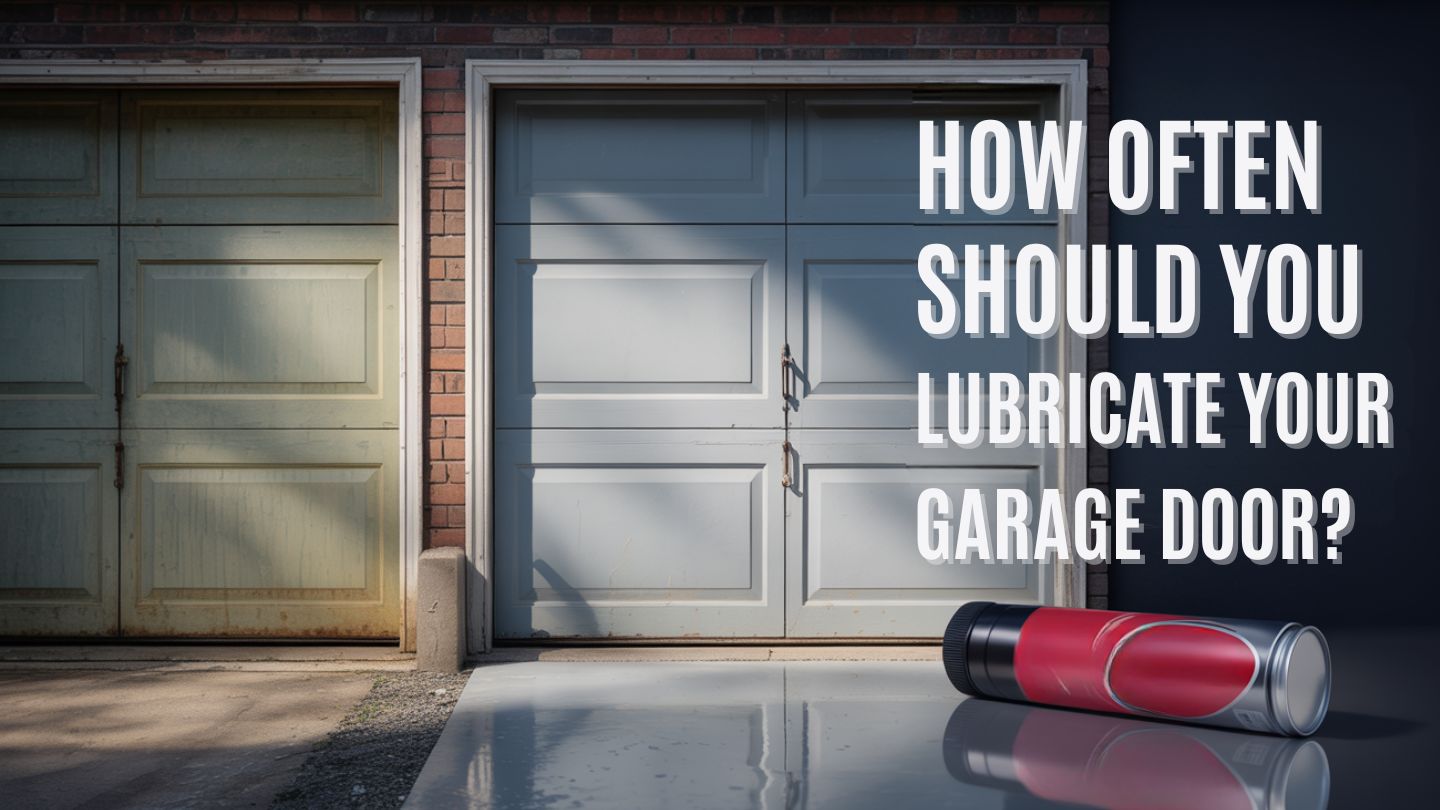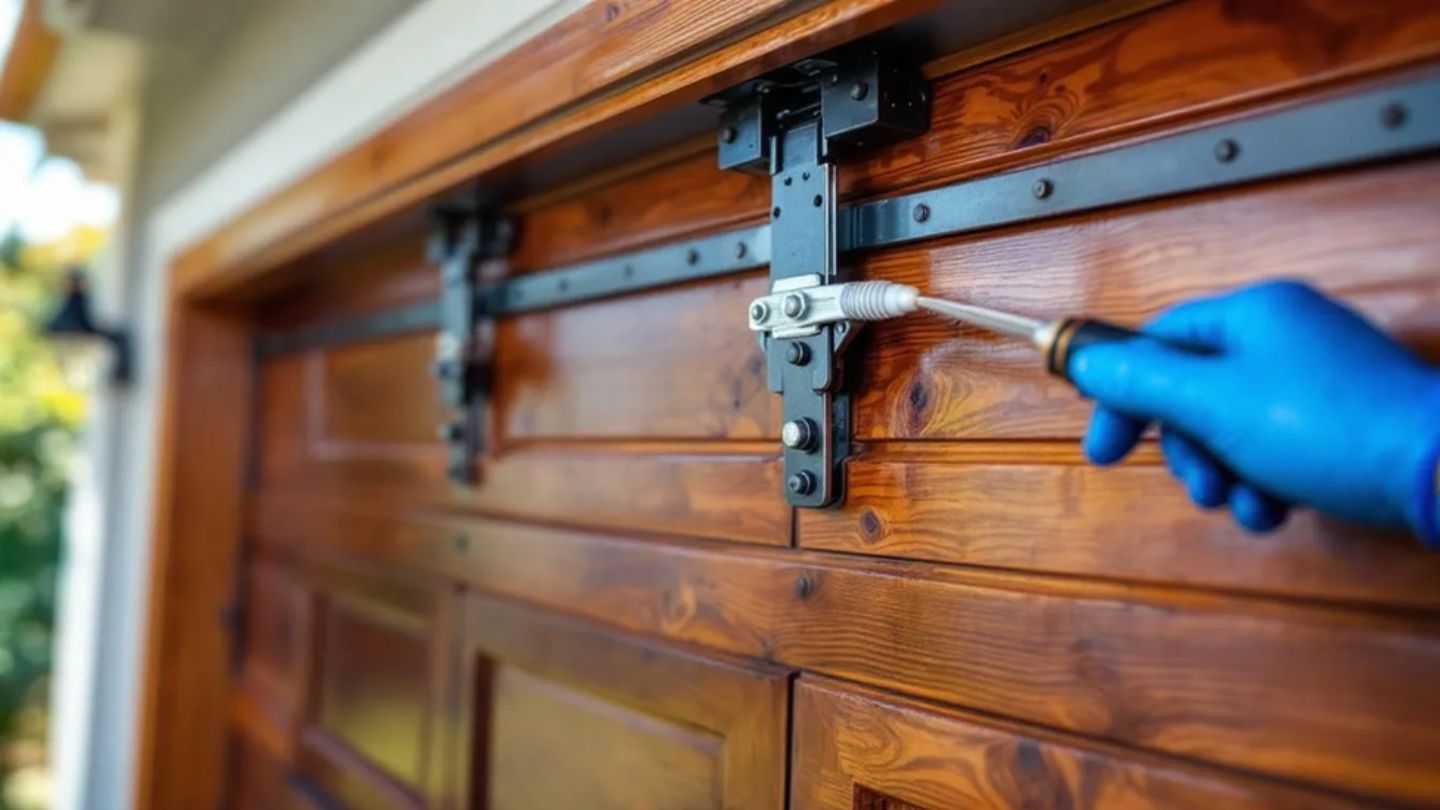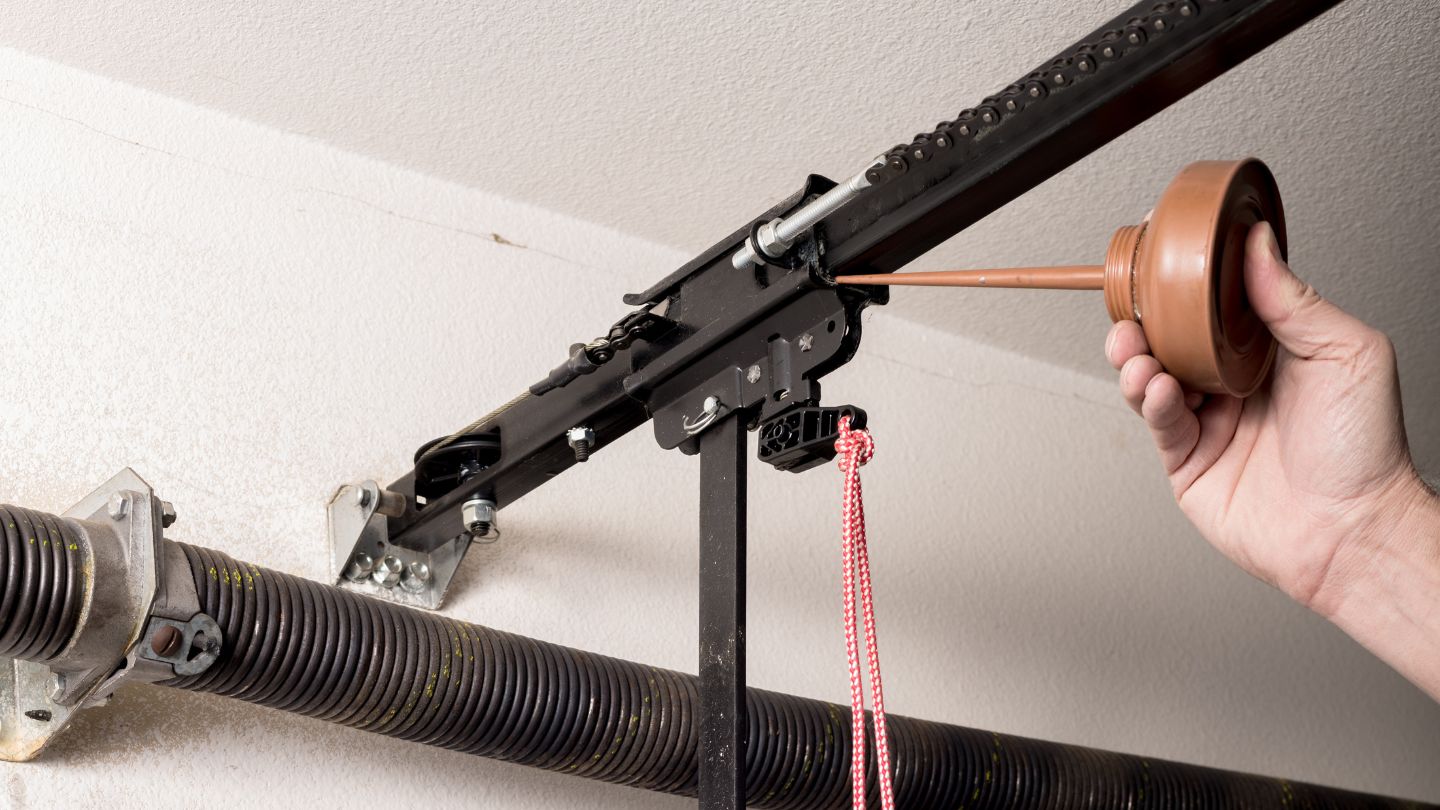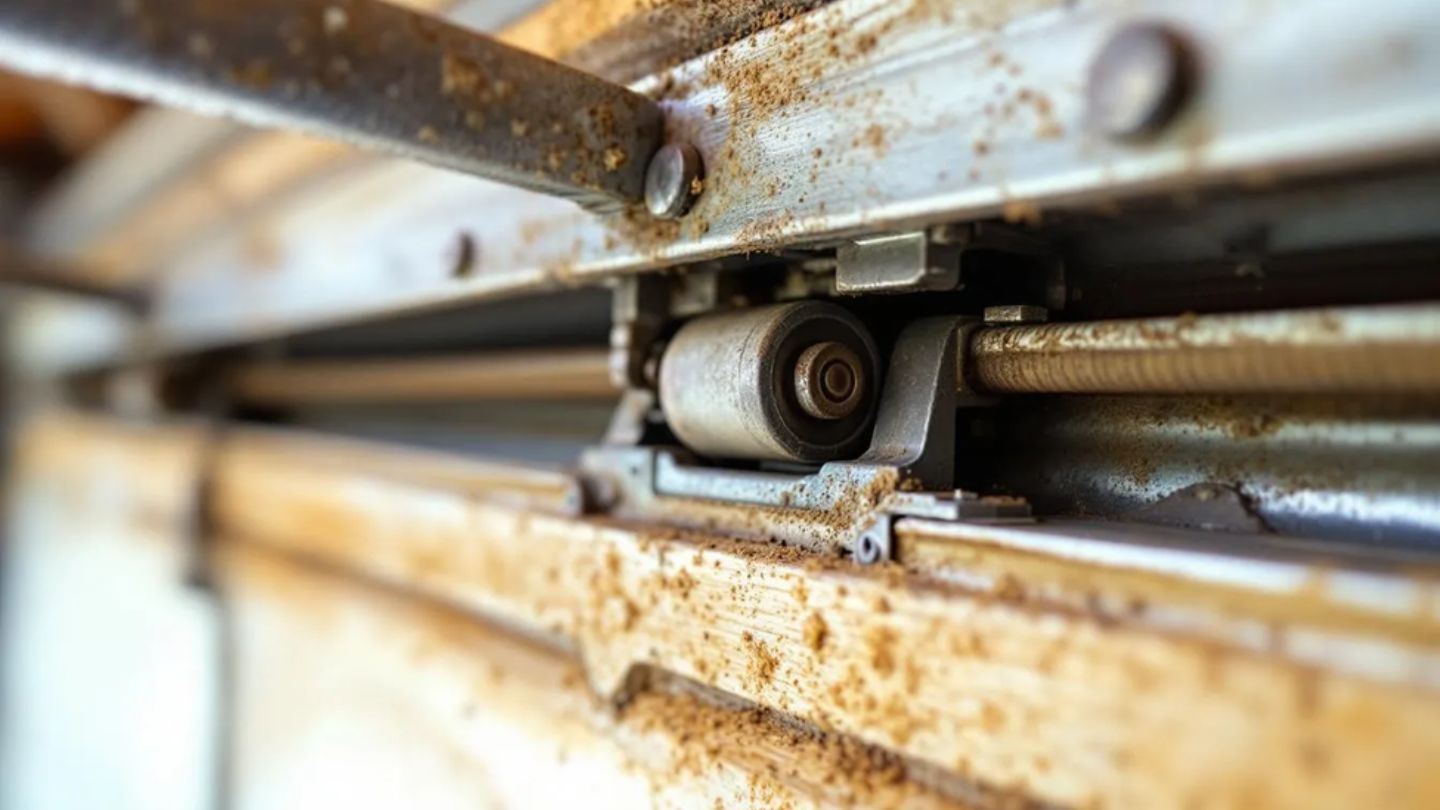
Regular maintenance is key to keeping your garage door in top condition, and lubrication plays a big role in that process. While it’s generally recommended to lubricate every six months, many homeowners wonder: how often should you lubricate your garage door? Staying consistent with this upkeep helps prevent noise, reduce wear, and extend the system’s lifespan. In this blog, we’ll look at the factors that affect lubrication frequency and share expert tips for doing it the right way.

Regular lubrication maintains the performance and longevity of garage doors, preventing costly repairs and ensuring safety and convenience. Applying lubricant to garage door parts helps avoid wear and tear, preventing problems that arise from neglect. Without lubrication, garage door parts can squeak and wear out faster, potentially leading to breakdowns.
Imagine living with a noisy garage door making loud, disruptive noises every time it opens or closes. Lubrication keeps the garage door nearly silent during operation, significantly reducing noise. Neglecting regular lubrication results in stiffness and noise, making the door operation uncomfortable and disruptive.
Regular lubrication provides several benefits for your garage door:
These steps ensure your new garage door is working correctly and the replacement runs smoothly and efficiently.
Read more: Why Your Garage Door Makes Loud Noise When Opening and How to Fix It
How often you should lubricate your garage door is influenced by several key factors. These factors determine the maintenance schedule. Weather conditions and frequency of use are significant considerations. Extreme climate conditions necessitate more frequent lubrication to prevent rust and corrosion in garage door components. For instance, if you live in a humid or coastal area, the salt and moisture can wreak havoc on metal parts.
The frequency with which you use your garage door also plays a crucial role. Moving parts of a garage door should be lubricated every three months or more often with heavy use or in specific climates.
Adjust lubrication schedules based on usage frequency and climate conditions to maintain optimal performance. This tailored approach ensures effective lubrication and extends the life of your garage door.
Read more: Ways to Weatherproof a Garage Door
For typical households, it is advisable to lubricate garage doors every six months. This biannual check helps maintain the smooth operation and longevity of your garage door. Experts recommend lubricating your garage door once or twice a year for maintenance.
The frequency with which a garage door should be lubricated depends on several factors:
It’s essential to tailor the lubrication schedule to your specific needs. Homes with heavy garage door usage may require quarterly lubrication. In milder climates with less frequent use, a biannual schedule might suffice. This tailored approach keeps your garage door in top condition year-round.
Understanding how regular maintenance from a garage door professional can extend its life is essential for homeowners. Scheduled inspections, lubrication, and part adjustments reduce wear, prevent costly breakdowns, and ensure smooth, long-lasting operation.
Conduct a thorough inspection before starting the lubrication process. Start by inspecting for loose bolts and screws, as securing these can prevent future issues. Verify that safety features like the garage door’s emergency release are functional.
Disconnect the power supply to avoid unexpected garage door movements.
Safety first! When working on an automatic garage door, make sure to secure your garage door by following these steps:
This not only enhances safety but also prevents damage during maintenance.
First, clean the chain and track of the garage door. Then, unplug the opener motor before lubricating the chain.
Cleaning your garage door tracks ensures smooth operation and prevents dirt buildup. Use a soft brush to remove debris and buildup from the tracks. This simple step can prevent more significant issues down the line and ensure your garage door runs smoothly.
Wipe down the tracks regularly with a dry cloth to maintain cleanliness. Use a mixture of water and vinegar to remove stubborn grime from the tracks. Clean tracks prevent dirt and dust from interfering with the door’s operation.

Gather lubricant, cleaning supplies, and tools to properly lubricate your garage door. Lubricate the hinges, rollers (bearings), springs, bearing plates, opener rail, and lock mechanisms.
Open and close the door several times after lubricating to spread the grease. Do not lubricate the tracks and nylon roller surfaces to avoid attracting dirt and debris.
Lubricating hinges and rollers reduces friction, ensuring smooth door movement. Apply lubricant to each hinge at the bending points to ensure smooth operation. Spray lubricant on ball bearings inside the rollers to ensure smooth function.
However, avoid applying lubricant to nylon rollers as it can damage them. Properly lubricating hinges and rollers ensures smooth operation and extends the life of your garage door.
To lubricate torsion springs and bearing plates, follow these steps:
Lubricating torsion springs and bearing plates maintains smooth operation and enhances the longevity of your garage door springs. Proper lubrication of these components prevents wear and tear, reduces noise, and ensures smooth operation.
Read more: What to Do When a Garage Door Spring Breaks: Quick Solutions and Safety Tips
Apply lubricant to the top of the opener rail and spread it evenly with a cloth. Lubricating the track allows the rollers to move smoothly along it. Additionally, using lube can enhance the effectiveness of the lubricant.
Wipe away excess lubricant after applying it to prevent buildup that attracts dirt. This ensures the opener rail operates efficiently, contributing to the smooth operation of your garage door.
Read more: What Size Garage Door Opener Do I Need: A Quick Guide to Choosing
White lithium grease is preferred for garage door lubrication as it provides lasting protection and reduces noise. Silicone sprays or white lithium grease are effective for lubricating garage doors.
Avoid using engine oil on garage doors as it can attract dirt and grime. Do not use heavy greasing on garage doors, as they can increase friction.
Products like WD-40 Specialist are designed for lubrication rather than cleaning. Regular WD-40 is a cleaner, not a lubricant, and may leave a small layer of mineral oil that is insufficient for garage door components.

Grinding sounds and slow operation are common signs that your garage door needs lubrication. If your garage door hesitates during operation, it likely requires lubrication, especially if you hear grinding noises.
A slow-moving garage door often indicates insufficient lubrication. Check for visible rust or corrosion on components, as this signals the need for lubrication. Neglecting lubrication can cause rusting, leading to inconvenient malfunctions and forcing manual door operation.
Professional technicians use advanced tools and equipment for efficient, accurate repairs. Regular servicing offers several benefits:
Professional regular maintenance reduces the risk of injury from handling heavy garage door components. Routine lubrication and checks can identify minor issues before they require costly repairs.
Read more: Top Benefits of Using a Commercial Garage Door Repair Service
Regular lubrication is key to keeping your garage door running smoothly. It reduces wear and tear, minimizes noise, and extends the life of essential components. Factors like climate, frequency of use, and proper lubrication techniques all play a role in ensuring long-term efficiency and performance.
For reliable care, trust Dayton Door Sales for professional garage door service in Dayton. Their expertise helps identify potential issues early and provides thorough maintenance that keeps your garage door operating safely, quietly, and efficiently for years to come. Proudly serving Kettering, Tipp City, Bellbrook, and surrounding areas, they make sure your garage door stays in top shape. Contact us for more information or to schedule a service.
Lubricating your garage door once or twice a year is generally sufficient, but if you experience extreme weather or heavy usage, you should lubricate it every three months for optimal maintenance. Regular upkeep will ensure smooth operation and longevity of the door.
For optimal performance, use white lithium grease or silicone sprays on your garage door, as they effectively reduce friction without attracting dirt. Avoid using engine oil or heavy greases.
Your garage door is likely making grinding noises due to a lack of lubrication on its moving parts. To resolve this, inspect and lubricate the hinges, rollers, springs, and opener rail for smoother operation.
You can perform garage door lubrication yourself, but hiring a professional guarantees comprehensive maintenance and can help spot potential issues before they escalate.